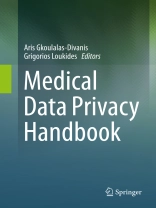This handbook covers Electronic Medical Record (EMR) systems, which enable the storage, management, and sharing of massive amounts of demographic, diagnosis, medication, and genomic information. It presents privacy-preserving methods for medical data, ranging from laboratory test results to doctors’ comments. The reuse of EMR data can greatly benefit medical science and practice, but must be performed in a privacy-preserving way according to data sharing policies and regulations. Written by world-renowned leaders in this field, each chapter offers a survey of a research direction or a solution to problems in established and emerging research areas. The authors explore scenarios and techniques for facilitating the anonymization of different types of medical data, as well as various data mining tasks. Other chapters present methods for emerging data privacy applications and medical text de-identification, including detailed surveys of deployed systems. A part of the book is devoted to legislative and policy issues, reporting on the US and EU privacy legislation and the cost of privacy breaches in the healthcare domain. This reference is intended for professionals, researchers and advanced-level students interested in safeguarding medical data.
Spis treści
Introduction to Medical Privacy.- A survey of anonymization algorithms for electronic health records.- Differentially Private Histogram and Synthetic Data Publication.- Evaluating the Utility of Differential Privacy.- SECRETA.- Putting Statistical Disclosure Control into Practice.- Utility-constrained Electronic Health Record Data Publishing Through Generalization and Disassociation.- Methods to Mitigate Risk of Composition Attack in Independent Data Publications.- Statistical Disclosure Limitation for Health Data.- A Review of Privacy Preserving Mechanisms for Record Linkage.- Application of Privacy Preserving Techniques in Operational Record Linkage Centres.- Privacy Considerations for Health Information Exchanges.- Managing Access Control in Collaborative Processes for Healthcare Applications.- Automating Consent Management Lifecycle for Electronic Healthcare Systems.- e-Health Cloud.- Preserving Genome Privacy in Research Studies.- Private Genome Data Dissemination.- Threats and Solutions for Genomic Data Privacy.- Medical Image Security.- Privacy Considerations and Techniques for Neuroimages.- Data Privacy Issues with RFID in Healthcare.- Privacy Preserving Classification of ECG Signals in Mobile e-Health Applications.- Strengthening Privacy in Healthcare Social Networks.- Privacy Law, Data Sharing Policies, and Medical Data.- HIPAA and Human Error.- De-identification of Unstructured Clinical Data for Patient Privacy Protection.- Challenges in Synthesizing Surrogate PHI in Narrative EMRs.- Building on Principles.- Epilogue.
O autorze
Aris Gkoulalas-Divanis received the BS from the University of Ioannina (2003), the MS from the University of Minnesota (2005) and the Ph D from the University of Thessaly (2009), all in Computer Science. His Ph D dissertation was awarded the Certificate of Recognition and Honorable Mention in the 2009 ACM SIGKDD Dissertation Award. From 2009 to 2010, he was appointed as a postdoctoral research fellow in the Dept. of Biomedical Informatics, Vanderbilt University, working on medical data privacy. In 2010, he joined IBM Research-Zurich, as a Research Staff Member. Since 2012, he is working in the Smarter Cities Technology Center of IBM Research-Ireland, leading research in the area of data privacy and anonymization. Aris is a regular reviewer for several prestigious journals and serves in the program committee of major conferences. He has co-authored/co-edited 4 Springer books in the areas of data anonymization, knowledge hiding, and large-scale data mining.
Grigorios Loukides is an Assistant Professor in the School of Computer Science & Informatics at Cardiff University and a Royal Academy of Engineering Research Fellow. His research interests lie broadly in the field of data management with a focus on privacy. His recent research investigates theoretical and practical aspects of data privacy, including algorithmic design, optimization, and formal modeling, and explores applications in healthcare and business. He has received 4 best paper awards, including an award from the American Medical Informatics Association (AMIA) Annual Symposium, 2009. He obtained a Diploma in Computer Science (2005) from University of Crete, Greece, and a Ph D in Computer Science (2009) from Cardiff University, UK.












